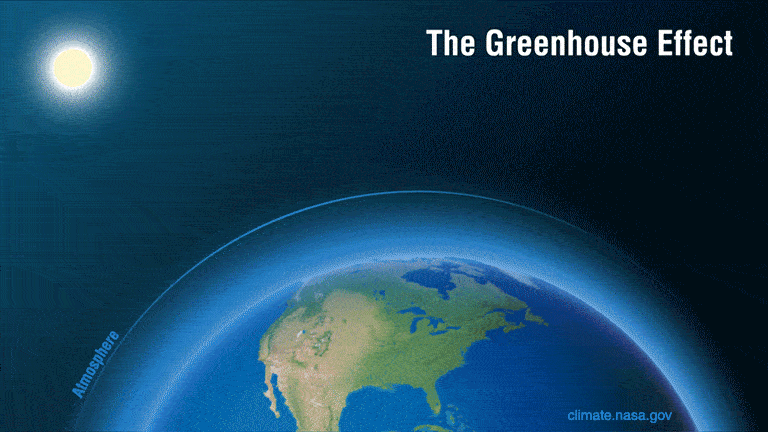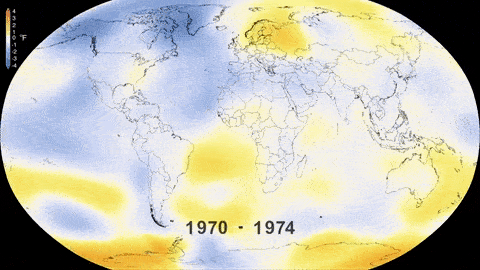Climate change is a permanent transformation in the average temperature and precipitation of a region. These changes occur gradually over a period of time. Climate change initiates the following implications in our environment.
- Sea Levels rises
- Changing temperatures and perception
- Melting Glaciers
- Rate of Meltdown of ice increases Greenland, Antarctica, and the Arctic
- Changes in flower and plant nurturing times.
Alaska’s Muir Glacier between August 1941 to August 2004

Greenhouse Effect
The main reason for global warming is the Greenhouse effect:” A natural process by which the atmosphere retains some of the Sun’s heat, allowing the Earth to maintain the necessary conditions to host life.”
Importance of Greenhouse Effect
Without the Greenhouse effect, the average temperature of the planet would be -18ºC.
The problem is that daily human activities maximize the greenhouse effect, causing the planet’s temperature to increase even more.

A simplified animation of the greenhouse effect. Credit: NASA/JPL-Caltech
Causes of Greenhouse Effect
Scientists agreed that in the last 50 years Earth temperatures increased due to human activities. Certain Poisonous gases like Carbon dioxide, Methane, Nitrogen Oxide, Sulphur dioxide, and Carbon monoxide blocks heat from escaping from Earth’s atmosphere. This is called the greenhouse effect. These gases keep Earth warm like glass in a greenhouse keeps plants warm.
“How earth’s temperature increased from 1971 to 2015 shown in the picture below”

Pakistan and Climate Change
Pakistan’s climate change concerns include
- The Unpredictability of monsoons.
- The likely impact of diminishing Himalayan glaciers on the Indus River system.
- Decreased capacity of water reservoirs.
- Reduced hydropower during drought years.
- Extreme events including floods and droughts.
What the government should do
Government should take the following actions:
- Start urgent reforestation and on mountain slopes. Northern areas have undergone severe deforestation due to a lack of access to electricity and natural gas.
- The Billion-tree Tsunami movement is the first-class beginning but needs to be scaled up in the long-term.
- The population and the general community also need to be engaged in mass cultivated area drives across the country
- Build dams in “Thar” to store rainwater.
- Develop and apply a waste management strategy for hilly areas. Since the pile of waste produced in hilly areas has nowhere to dispose of their waste, they end up either throwing it in the rivers, burning the waste in the open air.
- Ban diesel vehicles in the mountains. An increasing number of tourists visiting the scenic mountains in the north opt for using diesel.
- Switch to renewable energy sources. We have massive potential for solar energy in Thar and hydropower in the north which can provide clean, cost-effective, and uninterrupted energy.
- Deploy a practical approach rather than a diehard one.
- We usually react to a disaster once it has happened, instead of preparing ourselves beforehand. The proactive approach of preparedness and foresightedness will save much time, money, and lives.
- Make climate change a priority in the development and political agenda. Climate change will have an effect on every area of human and economic progress and needs to be taken into account at every level.
What can you do?
We, each in our own ability and society, have the influence to take climate action and start from yourself.
- You can make local climate discussion groups start the conversation, reach out, help and support vulnerable people and take collective action.
- It takes courage to focus on a positive and action-oriented approach.
- Go work for or volunteer with a local organization working on climate change issues
- Please think again about piling your plates with excess food the next time you’re at a wedding or party. Currently, 40% of the food in Pakistan goes to waste while 43% of our population is considered food insecure.
- What most people don’t realize is that food waste is also a big contributor to climate change.
- Methane is a powerful greenhouse gas, is emitted from rotting food in landfills.
- You can also help by donating excess food to a charity to the needy.
A World bank Report about Pakistan
A World Bank report released in July 2018 describes the effect of temperature and precipitation on living standards. This report claims that by 2050, Annual average temperatures are projected to increase to 2.5°C under the climate.
Uninhabitable in Future
Nearly 49 million, or 25 percent of Pakistan’s total population, lives in locations that will become ‘reasonable hotspots’ by 2050 under the carbon-intensive scenario. Containing the temperature is necessary to prevent major areas of Pakistan from becoming uninhabitable in the future not too far away.
Most Vulnerable Hotspot of Pakistan
According to a report Sindh is the most vulnerable hotspot. With a GDP per capita of US $1,400, Sindh is the second-largest economy of Pakistan and contributes 30 percent to the national GDP. Its economy is highly diversified, ranging from heavy industry and finance centered in and around Karachi to a substantial agricultural base along the Indus River.
Second most Vulnerable Hotspot
The second most vulnerable hotspot is the densely populated province of Punjab. Punjab has the largest economy, contributing 53.3 percent to Pakistan’s GDP, and is known for its relative prosperity with the lowest poverty rate of all the provinces. However, its wealth is unevenly distributed, However, its wealth is unevenly distributed, with the northern portion being relatively well off economically and the southern portion being one of the most impoverished areas in the country.
Hotspot Districts
Fascinatingly, some of the most compactly populated cities including Lahore, Multan, and Faisalabad appear among the top 10 hotspot districts. This indicates the significance of preparing not only the more impoverished areas for the unfavorable effects of climate change but also defending the economic hubs of the province.
Time of Action
With a limited and fast-closing window of opportunity to tackle this global challenge, it is more important now for Pakistan to engage in global climate change discourse and accordingly adjust its development agenda.

